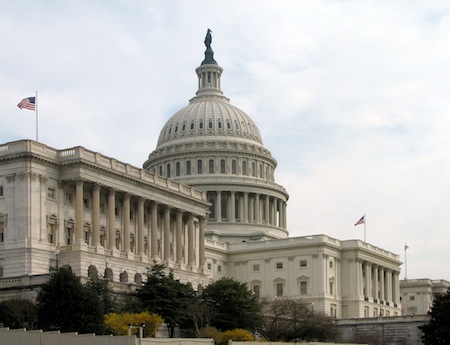Bipartisan House Group Re-Introduces Email Privacy Bill
The smarter way to stay on top of the multichannel video marketplace. Sign up below.
You are now subscribed
Your newsletter sign-up was successful

A bipartisan House contingent has re-introduced the Email Privacy Act, a bill that would require law enforcement to get a warrant before law enforcement could access ISP's digital records, such as e-mails and texts.
The bill was introduced by Rep. Kevin Yoder (R-Kan.) and Jared Polis (D-Colo.), with the backing of Rep. Suzan DelBene (D-Wash.).
DelBene pointed out that among the bill's backers are the ACLU, Center for Democracy and Technology, Electronic Frontier Foundation, Amazon, Apple, Facebook, Google, Microsoft and Twitter.
Related: Email Privacy Act Gets Warm Reception
The House was not the problem with the bill last year. It was the Senate that couldn't agree on a way forward.
The bill passed the House unanimously in the last Congress, but was held over by the Senate Judiciary Committee after amendments were offered that could have undone a compromise approach
The bill updates the Electronic Communications Privacy Act to require the government to get a probable cause criminal warrant to access e-mails, social media posts and other online content stored in the cloud by Internet service providers and other e-mail service providers, like Google. In a nod to the longevity of cloud storage, it eliminates the 180-day sunset on stored communications. Previously a warrant was not required for communications stored beyond 180 days. It also allows providers to let their customers know when their data has been requested, though the government can seek a court order to delay that notification in special circumstances (the imminent threat of a terrorist attack, for example, or other immediate threats to life of property).
The smarter way to stay on top of the multichannel video marketplace. Sign up below.
"After spending two decades in the technology sector where things evolve at light speed, it is hard to believe that we’re starting another year with laws that were written for how computing worked in the 1980s," said Del Bene. "Meanwhile, cloud-based services become more ubiquitous with every passing day, highlighting the absurdity that current law provides greater protections for a letter in a filing cabinet than an email on a server. The Email Privacy Act is an overdue step forward for protecting Americans’ civil liberties in the digital age."
Del Bene spent a dozen years at Microsoft, where she was corporate VP of mobile communications.
“The Fourth Amendment protects all of our 'papers and effects' against warrantless search and seizure from the moment that they’re created, but woefully outdated current law leaves the full content of all of our emails, texts, tweets and cloud-stored photos and documents open to warrantless search for six months after they’re created," said American Library Association President Julie Todaro. "Last year, both the House Judiciary Committee and House of Representatives unanimously passed the identical Email Privacy Act introduced today to close this gaping hole in Americans’ constitutional privacy rights, but the Senate was unable to act. ALA calls on both chambers of Congress to immediately enact and send this uniquely bipartisan and long-overdue update of our laws to the President in time for him to mark Data Privacy Day on January 28, 2017, by signing it into law.”
“Our country has always respected the need to balance law enforcement interests with protections for citizens, so it’s no surprise that updating digital privacy law for this century has broad, bipartisan support," said Computer & Communications Industry Association President Ed Black. "Government access to communications without oversight of warrants is a dangerous path for any country that supports democratic values. We hope recent events and the desire to build a better spirit of cooperation will bring this legislation to an early vote this Congress. Cooperating to pass such a pro-democracy measure with broad support could help set the tone for better relations and trust between Democrats and Republicans and between citizens and government.”
“TechNet applauds Representatives Kevin Yoder and Jared Polis for reintroducing legislation that would make critical updates to our nation’s outdated electronic communications privacy laws,” said TechNet President Linda Moore. “These laws have not been updated since 1986 – a time when the modern Internet and the cloud did not exist.”
“The proposed legislation makes clear that the warrant standard of the U.S. Constitution applies to private digital information just as it applies to physical property. It also ends ECPA’s arbitrary ‘180-day rule,’ which permits email communications to be obtained without a warrant after 180 days. Additionally, it makes a key clarification that ensures a document stored in the cloud receives the same protections that it would if it were stored under user control.”
Contributing editor John Eggerton has been an editor and/or writer on media regulation, legislation and policy for over four decades, including covering the FCC, FTC, Congress, the major media trade associations, and the federal courts. In addition to Multichannel News and Broadcasting + Cable, his work has appeared in Radio World, TV Technology, TV Fax, This Week in Consumer Electronics, Variety and the Encyclopedia Britannica.

